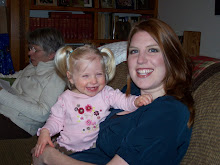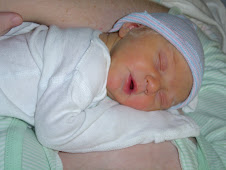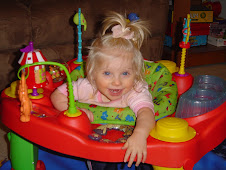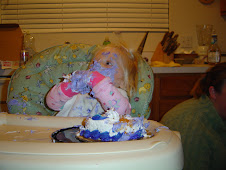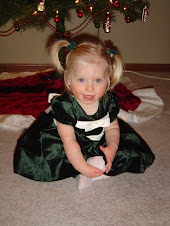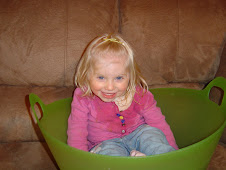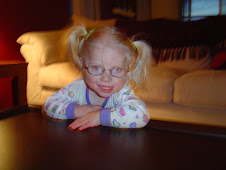Below is Aubrey's Story, for recent updates on Aubrey and the rest of our family - check out
http://oh-my-gosch.blogspot.com/
An Angel is Born
Aubrey was born on Nov 15, 2006. She was born full term with no complications. She was a great baby - no feeding problems, started sleeping through the night relatively early, and was very social! We first noted her developmental delays around 6 months. Her pediatrician told us not to worry at the time, but if still concerned at 9 months with gross motor, fine motor and speech delays that we should see a Developmental Specialist.
Concerned
By 9 months we were still concerned - while she was making some progress, it was very slow. She was still not making any babbling noises, was not crawling or transitioning from sitting, was not displaying "typical" play skills (not banging things together, no clapping, not much interest in toys). We then contacted the school system for the Early Intervention program and made an appointment with a Developmental Specialist (we would have to wait 4 months to get in). Aubrey started PT/OT and some speech work one time a week in January 2008. We were very encouraged to see how well she was responding - especially with the gross motor skills but were still anxious to visit the specialist.
See a Specialist in Jan 2008
On Jan 15, 2008 - we had our appointment with the Developmental Specialist. She evaluated Aubrey for about 2 hours. Her major concerns were her head size (when she was born 25%; at 6 months 10%; at one year 4%; at check-up it was off the charts) and she also noted her "herky-jerky" movements and her happy and silent demeanor. She ordered an MRI and chromosomal blood work to investigate what was causing her delays. These tests occurred on Feb 15, 2008. (Knowing what we do know - I find irony in the fact that all these appts/tests were on the 15th of each month!)
PVL diagnosis
Anyway, we received the MRI results back the next week. We learned that Aubrey had Periventricular Leukomalacia (PVL). This was explained as mild brain damage affecting the area of the brain that is associated with muscle and motor control. The three most common problems resulting from PVL are: cerebral palsy (CP) ; developmental delays (including mental retardation) ; and behavior problems. The doctor told us that PVL can affect patients in such a wide variety of ways. Some children, through therapy get "caught up" on their development and only show a bit of clumsiness in their movements. Others will develop severe CP and will need the use of wheel chairs and feeding tubes. Our doctor remained hopeful that Aubrey would be on the mild spectrum - however it was too early to tell exactly how it would affect her motor and cognitive abilities long-term. This was the first blow. We had an "answer" - but were even more confused on what it really meant for Aubrey and her future. The range was so large that it was hard for us to grasp what to expect. We continued with her PT and were waiting for the blood work to come back. But to be honest we were dealing with the PVL diagnosis that we didn't think the blood work would show anything that would make things "worse." We weren't worried at all - we just focused on learning more about PVL and enjoyed Aubrey for who she was and the progress she was making.
Angelman Syndrome Diagnosis
Fast forward to March 2008. I received a call from the Doctor's office requesting a meeting on Thursday to go over the blood results. My heart sank - I knew that it had to be something big - otherwise she would have done it over the phone. On Thursday, March 13, 2008 - we met with the doctor and she started to explain that Aubrey had a deletion on her 15th chromosome and has what is known as Angelman Syndrome. My head was spinning. I thought Aubrey only had to conquer PVL - now she has to deal with AS too. The doctor explained that the two are un-related and she had only found a handful of recorded cases in the world where patients have both but that the AS will be the more prevalent of the two.
What is Angelman Syndrome?
Angelman Syndrome (AS) is a rare neuro-genetic disorder characterized by intellectual and developmental delay, lack of or minimal speech, seizures, sleep disturbance, movement and balance problems, and frequent laughter or smiling. AS is caused by a deletion or inactivation of genes on the maternally inherited 15th chromosome. There are estimated to be between 1000 and 5000 cases in North America. For a more in depth look and explanation of AS - please visit the Angelman Syndrome Foundation site at the following link: http://www.angelman.org/stay-informed/facts-about-angelman-syndrome/
So What does that really mean?
Aubrey will require 24-7 care for the rest of her life - yet there are so many more opportunities for people with disabilities than say 20 years ago. With the advances in medicine, therapies, and the general acceptance in today's educational system – she has a much better chance to live a long, active, and fulfilling life. Aubrey is a joy to be around and it is impossible NOT to be happy around her or start smiling. She may have her challenges in life - but she will always be there with a smile and non-stop energy to tackle them. She provides a constant reminder to cherish life and its gifts.
Monday, September 22, 2008
Subscribe to:
Comments (Atom)
